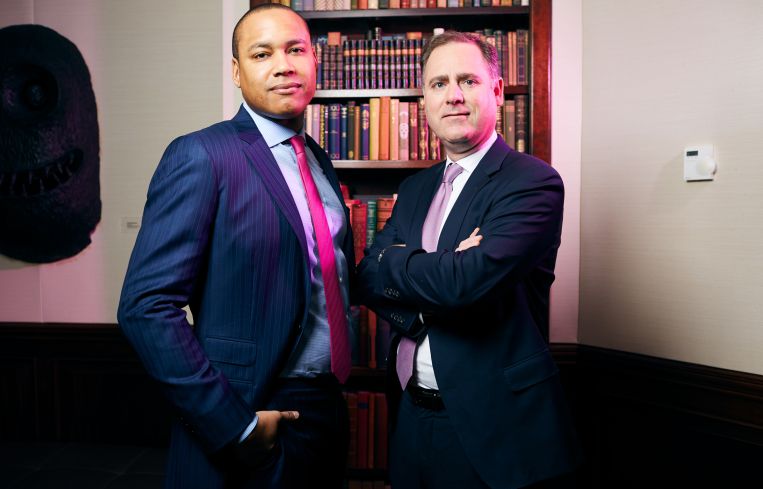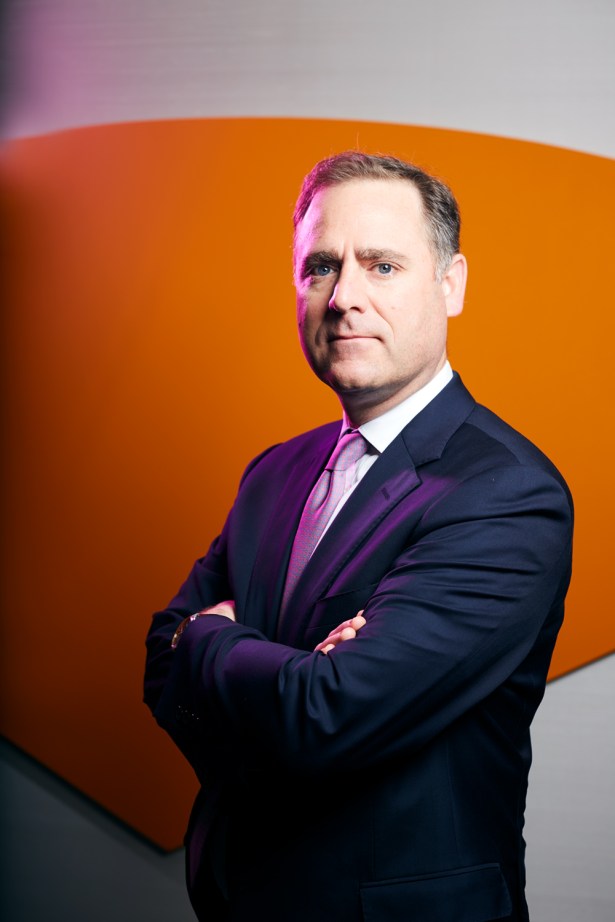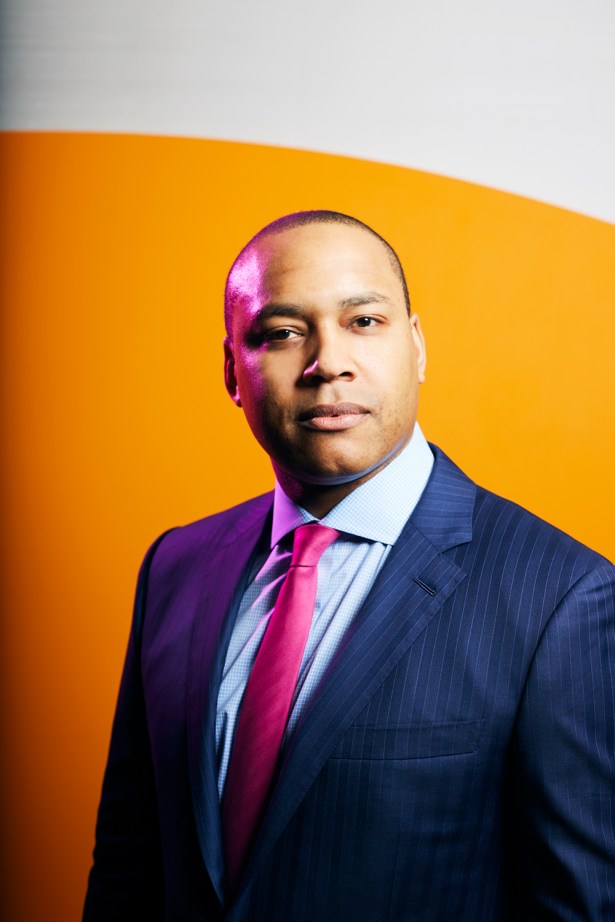Varsity Letters: Chris Lee and Matt Salem on KKR’s Debt Strategies
By Cathy Cunningham April 4, 2018 12:30 pm
reprints
Global investment firm Kohlberg Kravis Roberts & Co. was founded in 1976—so the story goes—when Henry Kravis and George Roberts dined together at (the now defunct) Joe and Rose restaurant on Third Avenue between East 46th and East 47th Streets. Today, KKR has $168 billion in assets under management (as of Dec.31, 2017).
The firm has had a private equity real estate strategy in place since 1981, but more recently it is being recognized as an increasingly powerful force in the debt space, too.
The firm has two debt strategies; KKR Real Estate Finance Trust (KREF)—an externally managed real estate investment trust (REIT) that originates senior commercial mortgage loans—and KKR Real Estate Credit Opportunity Partners (RECOP), which purchases junior tranches of commercial mortgage-backed securities.
“What takes several people years to build, in terms of size and breadth, they’ve accomplished in a couple of years,” said A.J. Sfarra, a managing director at Wells Fargo Securities. “They’ve raised a $1 billion B-piece fund and a mortgage REIT.”
KREF currently has a total market capitalization of $1.1 billion and a total portfolio size of $2.5 billion. It originated $1.5 billion of loans last year alone—$800 million in the tristate area—playing in the large loan, transitional and value-add space and competing with private lenders such as Square Mile Capital Management, Blackstone and TPG.
In November of last year, it raised a $1.1 billion fund for its RECOP strategy and is the most active buyer of CMBS B-pieces in the market, with an impressive 35 percent of market share. In 2017, it bought junior tranches on 12 deals, comprising $10.9 billion in principal balance. For all transactions, KKR satisfied either a portion or the entire risk retention requirement, retaining $949 million in face value of the bonds.
Chris Lee and Matt Salem, the firm’s co-heads of real estate credit, lead KKR’s debt business from the company’s headquarters at 9 West 57th Street between Fifth Avenue and Avenue of the Americas.
A “frustrated Cowboys fan,” Lee hails from Dallas. After studying economics at Emory University he got his industry start with a summer internship at J.P. Morgan Chase Securities, which then led to him to join Goldman Sachs’ commercial mortgage group as an analyst in 2000. He remained there until 2009 when he moved to Apollo Global Management, then to KKR in 2012.
“I like the competitive nature of it, where you’re out competing every day against very savvy investors to create transactions,” Lee—who turns 40 next month—said of his draw to commercial real estate. “I also like the personalities in real estate. You meet a lot of colorful people, and it’s one of the industries where you continuously interact, whether on the finance side or the development side.”
Jeff Fastov, a senior managing director at Square Mile Capital Management, was co-head of lending at Goldman Sachs when the young Lee joined the bulge-bracket bank, and Lee’s first boss out of college. “His raw intelligence is immediately apparent, and he’s incredibly personable and well-liked,” Fastov said of his protégé. “So when you put these two [attributes] together he’s a formidable competitor because people really like to do business with him.”
Salem, 44, is also a New York City transplant. A Kansas City native (and die-hard Kansas Jayhawks fan), he studied economics at Bates College in Maine and—bucking the traditional route of most Wall Street programs—moved back home after college instead to seek employment.
After “being turned down a bunch of times,” by local banks in his hometown, Salem took a job at Midland Loan Services in 1996. Its platform was growing and it was hiring college kids to assist in its expansion, he recalled. Three years later, he took a position at Travelers Insurance—owned by Citigroup at the time—and moved to New York City. It was there that Salem was tasked with investing in high-yield real estate debt and early mezzanine loans, before segwaying—serendipitously, perhaps—into buying CMBS B-pieces.
When Citi sold Travelers, Salem tried the sell side out for size, working at Morgan Stanley, before joining Goldman Sachs in 2006 as a CMBS trader and ultimately running CMBS trading for the investment bank through the crisis. In 2011, he joined Rialto Capital Management to build out its performing businesses, including high-yield lending platforms—such as preferred equity and mezzanine loans—as well as CMBS B-piece investing.

Meanwhile, over at KKR, Lee and KKR’s head of real estate, Ralph Rosenberg, were planning the next iteration of the firm’s real estate business.
“When I got here in 2012 we were figuring out where we wanted to start the business, so we started it in opportunistic real estate because we thought that would be the area we could differentiate ourselves the most,” Lee said. “The goal was to have an integrated business as a solutions provider where we could provide both equity and debt.”
KKR raised its first equity value-add fund—the $1.5 billion KKR Real Estate Partners Americas, or REPA—at the end of 2013. (“We bought a number of hotels in that fund as the hospitality recovery was starting to take hold,” Lee said. “So a lot of it was a buy-fix-sell strategy where we were buying assets that had broken capital structures or broken operations, fixing them then selling them.”) And it raised its $2 billion successor, REPA II, last year.
But Lee and Rosenberg wanted to further expand the business that KKR had evolved to include a credit business. They already knew that Salem was the man for the job.
“Matt had demonstrated the ability to lead and manage a team,” Lee said. “Rialto had a very active business across multiple products and we had very complementary skills. There was a view that we’d be able to do one plus one equals three if we put our different backgrounds together.”
Salem joined KKR, along with nine members of his Rialto team, in 2014.
“I thought it was an absolutely perfect move for him,” Sfarra said of Salem’s move to KKR, “and in way I couldn’t see him anyplace else. KKR is a world-class organization and he fits that mold perfectly.”
Since then, Lee and Salem have been off to the races, finding opportunity in the heightened regulatory environment and leveraging off KKR’s existing infrastructure.
“We both had a very consistent view of where the market opportunity was, and that was direct, transitional lending,” Salem said. “We didn’t think the banks were in a place to commit that capital anymore, and we thought that we had a different approach in being fully integrated into a global asset manager, and being able to draw not only from an experienced bench of private equity and credit professionals but also from those focused on real estate equity within our own team.
“We think like property owners and we can be flexible,” Salem continued. “So there was a great opportunity to commit capital both from a relative value perspective for our investors as well as differentiating ourselves in the market to our clients who are borrowers and property owners.”
KKR’s lending portfolio is heavily weighted toward office and multifamily assets (the opposite is true for hotels, which comprise less than 5 percent of KKR’s business) and it’s carving out a niche for itself in value-add plays in acquisitions as well as construction loan take-outs where leasing is taking longer than expected.
“We have tremendous range in our business,” Lee said. “This year we’ve quoted loans from $40 million up to $400 million and from Libor plus mid-200s to Libor plus 400. Borrowers are buying different properties and executing different business plans so being able to deliver a range of solutions across what they’re doing in their platform helps us to build that relationship and have more connectivity with them, as well as provide us with a better opportunity to prove our experience.”
Recent transactions include a $180 million loan on PIMCO and Zeller’s Fifth Street Towers—a 1.1-million-square-foot Class-A building in downtown Minneapolis. Like most of KKR’s loans, the deal included an initial funding component, in this case $130 million in upfront funding and $52 million in future funding. PIMCO purchased the building in 2015 and had implemented its business plan with some success but leasing was a little slower than expected and—midway through its business plan—it didn’t have access to additional capital to continue to lease the property. KKR stepped in, refinanced the existing loan and gave PIMCO the capital and runway to lease the building up further, closing the deal within three weeks.
The financing was arranged by Eastdil Secured, which has worked with KKR on multiple transactions.
“Chris can understand risks in a transaction very quickly,” said Grant Frankel, a managing director at Eastdil. “He’s very good at understanding the transactions where it makes sense to stretch, and which ones have the quantitative or qualitative intangibles that—as a lender—you may be willing to push a little harder on. He has a very good sense for that.”
Frankel said that the KKR team is easy to work with, too. “Chris and Matt’s originators are very collegial, very smart and they are all pleasant people,” he said. “They’ve built a really good culture. We [at Eastdil] have a similar culture from a collegiality perspective, so it works well.”
Closer to home, KKR made an inventory loan on the Zaha Hadid-designed apartments at 520 West 28th Street to Related Companies. The $200 million loan was collateralized by the property’s 30 remaining condos that were unsold at the time.
“It’s a very special project,” said Greg Gushee, an executive vice president at Related. “KKR quickly understood the structure, the value and our business plan and were extremely flexible in structuring something that would allow us to pursue that plan.”
Flexibility is one of Salem and Lee’s key selling points in making KKR stand out from the herd, Gushee said. “Some lenders get very fixated on their loan documents when there’s a twist or turn in a deal,” Gushee said. “Chris just says, ‘Okay. Let’s see what makes sense to do here…’ He’s always flexible and open to doing what makes sense for the asset.”
And, “they can come up with a structure very quickly, get a term sheet to you within days and they can close within 30 days, easily,” Gushee said. “[KKR is] the place to go if you want great execution. They look at the situation and they can customize the solution.”
Like everyone else in the debt space today, KKR is having to compete with a variety of capital sources for deals.
“It’s competitive, we wouldn’t argue with that, but it’s still a relationship business and it comes down to how you can help your borrower achieve their goal,” Lee said. “A lot of our borrowers aren’t looking to finance a property that is already stabilized; they’re looking for help to execute a business plan. Because we execute a lot of these business plans ourselves we can be very constructive in helping them to solve a capital issue.”
And while relationships are important, so are the cost of funds—something that definitely works to KKR��s advantage.
“Being part of a global asset management firm is extremely helpful for us and we think we have top-tier cost of capital in terms of what we receive from our lending counterparties,” Lee said. “We also have other ways to enhance returns because we have access to different tools at our disposal in terms of the way we finance ourselves, through our capital markets team and our $45 billion corporate credit business. A lot of those synergies accrue to the benefit of our company, KREF, and its shareholders. But that’s how you compete—on borrower experience and on price.”
Salem sees KKR’s speed of execution as the biggest differentiator in its segment of the market: “We’re a small team and not as rigid as [other lenders] so you don’t have to go through layers and layers of investment committee approvals and bank processes to get things changed if business plans evolve,” he said. “Things change in these buildings and they need flexibility and a lender that’s going to be able to work with them through these changes.”
KKR’s other vertical in its debt business, CMBS B-piece buying, has Salem’s name written all over it as a veteran in the space. Most recently, at Rialto, Salem had led a dominant team in the space.
The opportunity was driven by Dodd-Frank and risk retention regulations in the CMBS fixed-rate conduit market, specifically the carve-out that allows banks to pass some of their risk retention to a third-party purchaser.

“We thought it was a great opportunity because the banks weren’t going to want to hold that risk and we have the expertise to do it,” Salem explained. “We can create a retention vehicle with our relationships with like-minded, long-dated investors. Combining the institutional client base of KKR with our broad internal underwriting resources across private equity, corporate credit and real estate works well. We draw from all these resources and do all of the underwriting and diligence, which makes us very credible investors in the space.”
Sfarra has known Salem for 15 years. He first met Salem when he was at Citi and buying B-pieces from Wells Fargo. Sfarra hired Salem at Morgan Stanley and sold him B-pieces at Rialto and KKR. Additionally, Wells Fargo took KREF mortgage REIT public last year, leading the underwriting group. “He’s been a B-piece buyer, he’s been a colleague, he’s been a client and he’s a really good friend as well,” Sfarra said.
Further cementing their relationship, Wells Fargo also sold KKR its very first B-piece. “We’re really thrilled to support their business,” Sfarra said. “What they’ve done is built a really successful B-piece business in a really short period of time and the only way you can really do that is by having the capital to do it and by having great relationships. Their word is their bond so people want to transact with them and they’re very smart guys.”
Fastov met Salem when he was on the mortgage desk at Goldman Sachs. “He’s an incredibly smart guy, and very straightforward,” he said. “The B-piece business is one part real estate and one part capital markets which is why he’s so effective at buying CMBS B-pieces because you need both of these skills.”
And while KREF and RECOP continue to have success, so does KKR’s real estate equity business. The opportunity has evolved since 2011 from investing in broken capital structures coming out of post-crisis distress to more thematic investing, with KKR finding macro themes of interest and applying them through the real estate sector.
It also presents opportunities to lend to some of its competitors in the debt space.
Square Mile and KKR teamed up last June on a California office deal, with Square Mile providing a $92 million loan for KKR’s acquisition of 180 Grand—a 15-story, 279,000-square foot-office building located in the Lake Merritt submarket of Downtown Oakland.
“There was a lot of trust that we could deliver on the terms we offered and that we’d focus on what mattered in the transaction,” Fastov said. “When we agreed to do the deal together, Chris said, ‘Let’s stay in touch if there are any real issues in the documentation,’ and guess what? There were none. It’s an example of KKR doing a lot of different things, just as we are, and there are opportunities to be lenders to each other.”
Maybe it’s that out-of-state charm, but—as well as being highly respected deal counterparties—Lee and Salem are known for being all around good people and family guys.
Frankel describes Lee as “a good guy, smart and pretty cerebral. He’s a straight shooter and just a pleasant person you enjoy doing business with.”
“I get Chris’ holiday card every year and his kids are exceedingly cute. If Matt would send me his holiday cards I could comment there, but he doesn’t. So…that’s an issue,” Fastov said, laughing.
As for the future of KKR’s real estate credit business, “I think there’s a lot of growth ahead of us,” Salem said. “We’re one of the newer businesses at KKR. The firm views real estate and real estate credit as strategically important and a growth initiative, and so we’ll have resources and capital available to us to grow.” O.K., KKR.



